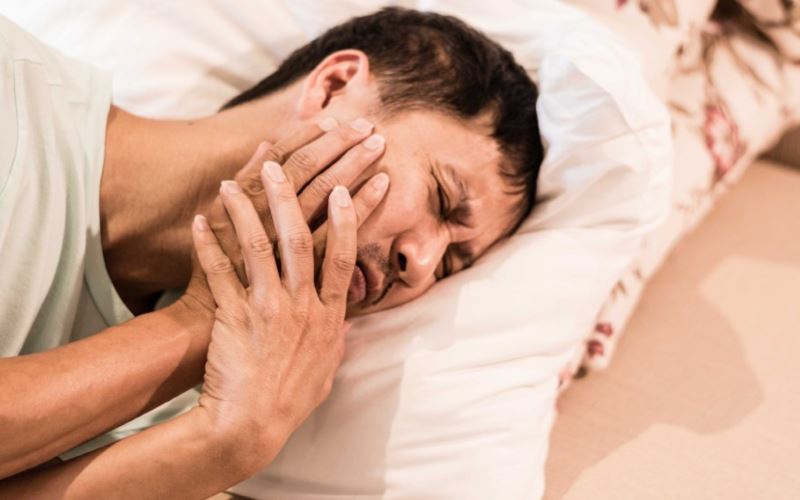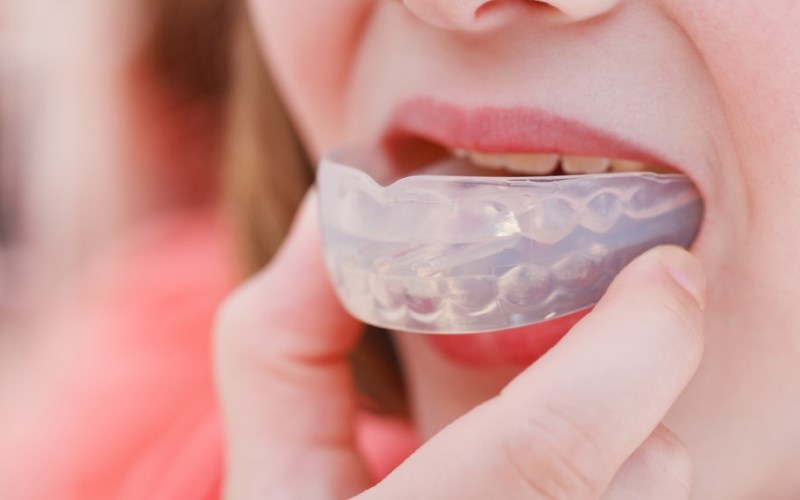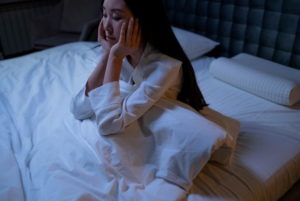People do a lot of things they are not aware of during sleep. Many snore, while some blabber random words, some can even speak in sentences. Others wrestle their pillows, while some get up and walk. Some even eat. Unsurprisingly, some clench their jaws and grind their teeth. This is called bruxism. While it may seem like a quirky and harmless habit, it is not. It can actually lead to a lot of oral and health issues, such as pain and tenderness around the jaw, ear, and neck. It can damage teeth, and more commonly, it can cause headaches and migraines, especially in the morning. Fortunately, there are ways to prevent teeth clenching headaches.
What Causes Jaw Clenching and Teeth Grinding
First off, you need to understand what makes you clench your jaw and grind your teeth while you sleep.
There are lots of factors that contribute to this behavior. One of the most common is stress and anxiety. When the mind is uneasy, your body tends to tense up. While asleep, the stress manifests through clenching and grinding. Similar things happen to people who have recently been through traumatic events – they clench their jaws and grind their teeth every time they remember their experience.
Crooked teeth, missing teeth, and an abnormal bite can also cause bruxism, also, Temporomandibular Joint (TMJ) Disorder is also a common culprit. Certain medications such as antidepressants and substances like alcohol, caffeine, and recreational drugs can also contribute to clenching and grinding.
How do you know you are clenching and grinding teeth while you sleep?
No matter what the cause of bruxism, the symptoms are almost the same, including:
- Morning headaches
- Migraines that don’t seem to respond to medications
- Tender points around the jaw
- Ear pain
- Neck pain or stiff neck in the morning
- Tooth sensitivity, damaged teeth (chipped and/or cracked molars)
- Sinus pressure
When you are sleeping next to someone, there’s a good chance they hear you grind your teeth while you sleep.
How teeth clenching headaches happen
The jaw joint is quite powerful; it tightens up when you clench your jaw. An average adult can bite down around 70 lbs of force per square inch around the molars. It can easily be doubled when you’re purposely bite down, clench your jaw, and grind your teeth. This force puts pressure on your jaw joint (TMJ), jaw muscles and tissues, and spreads all the way to your ears, neck, and head.
Since the muscles, tissues, and tendons are constantly overworked, clenching and grinding exhausts the body too. This results in tension that over time becomes a dull headache that does not seem to go away, as the muscles around the side of your face, neck, and even shoulders feel sore and tender.
How to know if your headache is caused by teeth clenching?
While it is easy to assume that your nagging and recurring headache is caused by bruxism, it would be best to rule out other factors. Thus, you should visit your physician or ENT to find out if there are underlying infections that may be causing or contributing to your headaches. A lot of people assume they have migraines or regular headaches, but in many cases, it is simply caused by severe muscle tension on the side of the face and head.
Check with your doctor
Doctors often use a technique called the Spray and Stretch. They apply vapocoolant on the muscle around the side of the face and see if the pain and headache lessens. If the headache diminishes with this kind of test, that means it is caused by muscle tension or jaw joint irritability.
Another way to know if your pain around the ear and neck is caused by bruxism is by looking up to the ceiling and tapping your upper and lower teeth together. If you feel some discomfort doing so, then you may be dealing with pain and soreness caused by bruxism.
Check your teeth
You can also check your teeth in the mirror. If you have been clenching your jaw and grinding your teeth as you sleep for a long time, you can see damage and signs of wear and tear on your teeth. Your cuspid (also known as canines) teeth should have nice points on them. If they have been flattened out, that means you may be unknowingly doing some teeth grinding that affects the structure of your teeth. That may be a huge factor for your headaches. Your dentist can easily diagnose this as well.
How to stop and prevent teeth clenching headaches
Manage stress and anxiety
As said earlier, stress and anxiety are the most common culprits for bruxism. Thus, your best start is to evaluate the stressors in your life (be it physical or emotional) and find a way to deal with them better. You can go to stress management counseling or find an activity or hobby that will reduce your stress levels. Just make sure the activity you have chosen doesn’t put strain on your neck and shoulders.
Wear night guards or bite splints
Your dentist can also recommend wearing a bite splint or night guard. Do not mistake a bite splint for a regular mouth guard you can find in sports stores and boil to fit your mouth. They are specifically designed by dentists to fit your bite.
Your dentist will make an impression of your jaw and bite, and mold it with dental acrylic along with special cushioning materials. Though bite splints will not necessarily stop you from clenching your jaw and grinding your teeth, it will cushion your teeth and jaw and minimize the force and damage. This reduces pressure on your jaw joint, protects your teeth from further damage, and helps relieve headaches.
Avoid the triggers
In many cases, bruxism can also be caused by certain triggers, such as alcohol, caffeine, smoking, vaping, and even watching TV or using your phone late at night. If you notice yourself grinding your teeth after doing these trigger activities, then it’s best to avoid them, especially near your bedtime.


























